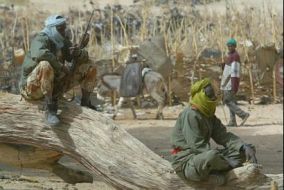Chad accuses Sudan of backing rebels near border
By Betel Miarom
N’DJAMENA, April 8 (Reuters) – Chad, Africa’s newest oil producer, has accused Sudan of seriously threatening its security by recruiting and maintaining some 3,000 rebels close to the border between the two countries.

|
|
Chadian soldiers guard the border with Sudan. (AFP/file). |
The allegations were likely to sour bilateral relations, already weakened by a vicious war in Sudan’s Darfur region, which borders eastern Chad.
“There is a build up of politico-military forces in the El-Geneina zone. It’s not a secret,” Chad’s Defence Minister Emmanuel Nadingar told Reuters.
“Three thousand Chadians are organised, prepared and heavily kitted out by the Sudanese government to destabilise Chad,” he said, adding that security measures had been taken to protect Chadians while waiting for “clarifications” from Khartoum.
El-Geneina is the capital of the West Darfur state near the border with Chad, an arid landlocked state twice the size of former colonial ruler France.
The Darfur crisis has created political and economic problems for Chad, with the government coming under pressure from both sides of the conflict for support. Chad has also accused Sudanese militias of launching cross-border attacks.
Tens of thousands have been killed and more than 2 million people have fled their homes in Darfur since a rebellion broke out in 2003. Thousands of refugees poured into eastern Chad last year, stretching meagre resources in the remote region.
Chad’s Communications Minister Barthelemy Natoingar Mbainodji said Sudan was guilty of “an unfriendly act” and that Chad wanted to draw the international community’s attention to the seriousness of the situation.
ETHNIC LINKS
Officials close to Chad’s presidency said a Sudanese delegation was expected to arrive in Chad’s capital N’Djamena later on Friday. No further details were immediately available.
Analysts say the situation in Darfur, whose Zaghawa tribe overlaps with Chad, had helped to determine the result of power struggles in Chad for decades and could threaten stability in the country, which started pumping oil in 2003.
Chad’s President Idriss Deby, a former army chief who seized power with help from Sudan and Libya in 1990, has faced a particular dilemma as he is from the Zaghawa tribe, whose members are battling Khartoum in Darfur.
He has faced pressure to back the rebels and surprised some in his tribe when he started acting as a mediator in the crisis, promising to remain neutral.
International observers say Zaghawas within Deby’s security forces have supplied Darfur rebels via Chad’s army.
Analysts say mounting dissent among Zaghawas over Darfur may have played a part in a brief army mutiny in Chad last year. The authorities said it was a prelude to kill the president and he blamed a crackdown on corruption in the army.
In a report last month, the Crisis Group said the appearance of new armed movements in Darfur and neighbouring states was among negative trends developing in the region since late 2004.
“Chaos and a culture of impunity are taking root in the region,” the influential think tank said.
Rebels in Darfur took up arms in 2003, accusing Khartoum of neglect and giving preference to Arab tribes.
Sudan is accused of mobilising Arab militias, known as Janjaweed, to loot and burn non-Arab villages in a scorched earth policy. Khartoum says it recruited militias but not the Janjaweed, whom it calls outlaws.
